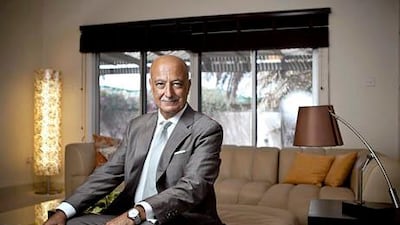Ziad Makhzoumi has what he calls a "challenge addiction". A glance through his curriculum vitae proves the point.
An engineer turned financial executive with stints in management consultancy and private equity, the biggest sea-change in his career came earlier this year when he gave up the hot seat as the finance director of the UAE construction company Arabtec Holding to become the chief executive of a Dubai-based chain of fertility clinics, Fakih IVF.
The move was a response to the "high reward DNA" Mr Makhzoumi says he possesses.
He had been the finance chief at Arabtec through the challenging times sparked by the 2009 financial crisis, until the group got a new dominant shareholder in the shape of Abu Dhabi's Aabar Investments. "Board and ownership changes signalled the need for a change [at Arabtec], and I assessed various opportunities," he says.
The macho world of construction seems to have little in common with the business of in vitro fertilisation, but "the business principles and growth expectations require expertise in strategy, finance, business processes, technology and organisational change. The medical part as a process has many similarities with engineering with various lab processes, medical procedures and a defined outcome expected, that have to be monitored to ensure success," he says.
So he finds himself in the fast-growing sector of UAE health care, with a company at the cutting edge of new medical techniques to solve the sensitive issue of human fertility.
Fakih IVF was founded by the Lebanese doctor Michael Fakih and his Emirati wife Amal Al Shunnar in 2010. Since then, it has grown to perform more than 1,500 fertility procedures per year.
Demographic changes in the Arabian Gulf countries, with more women choosing professional careers and delaying the start of a family until later in life, have led to increased demand for fertility services like Fakih, which have attracted support from governments keen to maintain the proportion of nationals in the population.
"The UAE has been projected as one of the upcoming IVF markets meeting all international health expectations and standards in terms of quality. It bears the potential to become a hub for promoting medical tourism keeping in mind the recent changes that have been introduced by the Government, healthcare facilities that meet international standards and the well- qualified doctors that are willing to serve here," says Mr Makhzoumi.
In addition to its complex in Dubai, Fakih has recently opened a state-of-the-art centre in Abu Dhabi, and is looking to expand farther into Al Ain, Sharjah and Ajman. Next year there are plans for new facilities in Qatar, Saudi Arabia and Kuwait.
"Fakih will also expand in complementary medical services of high value. We will expand our range through the complete cycle: getting the patient healthy and ready for pregnancy, helping them get pregnant and delivering healthy children. We will deliver that for sure," says Mr Makhzoumi.
Such an ambitious expansion plan requires long-term corporate and financial planning, and that's where his experience of such varied areas of expertise comes in.
"When that level of corporate maturity is reached based on the highest standards of corporate governance, then the options for a full or partial exit is open, but not a necessity. That could be through an IPO, a merger or a takeover by a private entity or a listed entity. That is definitely not expected to happen in the immediate future," he says.
He is aware, however, that recent IPOs in the healthcare sector have commanded high valuations on the London Stock Exchange. As things currently stand, Fakih's valuation would be higher, although the venue for a flotation - Europe or the UAE - would depend on other factors too, like the regulatory regime and ease of trading, he says.
For the moment, Mr Makhzoumi is happy with the economic and financial situation in the UAE: "The economic recovery has continued to strengthen amid favourable oil prices and capital inflows. The UAE is perceived as a safe haven status amid regional political and social unrest, capital flows have strengthened, demand from expatriates from the broader region has increased, and the real estate sector, which had been impaired since the 2009 crisis, has stabilised in Abu Dhabi and started to recover in Dubai."
Slipping back on his construction hard hat, he thinks government policy in the property market is just about right. "Regulation related to mortgage lending, including caps on loan-to-value and debt-to-income ratios, will help mitigate real estate-related risks, though the imminent effect on the residential market, currently largely a cash market, will be limited," he says.
With the stresses of Arabtec behind him and a new challenge ahead, Mr Makhzoumi - always a great business networker - seems firmly back in the Dubai social groove. At his favourite restaurant in the city, Zuma in the DIFC, he meets and greets friends and business associates with aplomb.
There is just one cloud on his horizon: the political and economic situation in his native Lebanon. He and his family have long been active in politics in the country, but his current view is not positive. "Unfortunately Lebanon is a beautiful country that has lost its way," he says.
